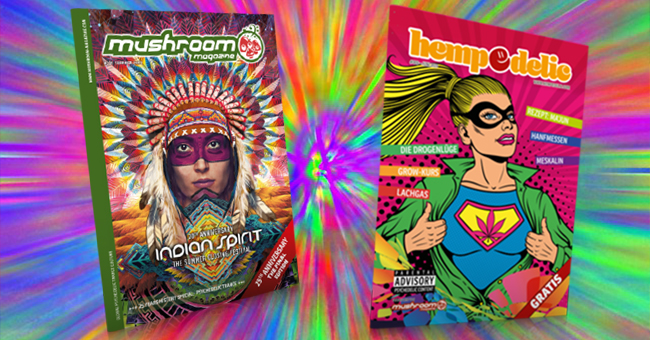There is a very intensive connection to nature in the Psytrance scene. After all, the festivals are held in the world’s most beautiful places: at old castles and palaces, around forest lakes and in deserts, on beaches, up in alpine cabins, in the Sahara, on Brazilians beaches, even on the Easter Islands. The spirituality in the scene is partly derived from the hippie ideology, the Rainbow philosophy together with elements from Hinduism, Neopaganism or the New Age cornucopia.
You simply can‘t have any environmental pollution in the places where natural spirits live and where the Greek goddess of the Earth resides, where the psychedelic experience allows the animals, plants and Gaia, the Earth, to be experienced as an integral part of oneself.
Unfortunately, the fraggle community’s mindset to the natural world around them is often a Janus-faced one. Whoever visits a location after a festival will often find big piles of rubbish there. Many just leave their rubbish and their broken tent behind and think that someone will clear it up sometime. The capacities of the toilet cabins are quickly reached as they are not pumped out often enough, the toilets are often smeared and dirty.
Bottles and cans that people throw away thoughtlessly lie strewn all over the place and the dancefloor is littered with cigarette butts. Obviously, some people think that if they have bought a ticket to the festival, they also have the right to dirty-up the location for a few days.
Still, there is the other side as well: There are those Goanauts who voluntarily pick up any litter they find lying on the paths or collect bagfuls of rubbish from the carpark and carefully stub out their cigarettes in little pocket ashtrays. I’ll never forget Jens Zygar from Star Sounds Orchestra who, in 2001 at the Solipse party in Zambia, himself went out onto the dancefloor to pick up all the cigarette butts before going on stage with his partner Steve Schroyder to start playing the mighty gongs.
Many parties have managed to install some kind of deposit system for plastic cups and bottles. Whilst some people don’t care about losing their deposit and can’t be bothered to bring their cups back, others deliberately go around picking up anything with a deposit on it and earn something towards their next drink. Sometimes biodegradable cutlery and plates made of wood or banana leaves are in use to reduce the amount of plastic waste.
The sustainability policy at the Boom festival held every two years is exemplary and was given the Greener Festival Award in 2008. The Boom festival stands for planetary consciousness and a clever ecologically-friendly concept which has made the zero emissions policy their goal.
The Boom focuses on the issues of climate change, the ecological footprint, the question of recycling and water consumption. Their twelve page eco-management plan conforms to the latest EU guidelines on effective and sustainable event management beginning with the planning work and finishing with the evaluation. It covers principles for reducing energy and water consumption and promotes renewable energies.
In 2008, the generators were run on 45,000 litres of used cooking oil resulting in a reduction of CO2 emissions of 117,000 kg. Wind generators and photovoltaic systems are also being used. Aquatic plants are being used as an intelligent solution to waste water treatment or a set plan for its evaporation is adhered to. The contents of the toilets are composted. The toilet cabins are painted black thus aiding the composting of the faecal matter strewn with sawdust. Even the rubbish is part of the recycling system.
In 2008, 150 people spent all week collecting rubbish round the clock. Unfortunately, not all festival goers follow the ‘Bring in – take out’ principle and take their rubbish back home with them again. For the Boom, it is not about avoiding costs for the collection and removal of waste but about creating awareness for ecological responsibility. Even the decoration is produced in accordance with stringent ecological criteria and has to fulfil certain requirements.
Organic food, vegetarian dishes, local and fair-trade products are mandatory. Even the way that people get to the festival is calculated and taken into consideration to minimise the ecological footprint. Lectures on ecology, holistic and sustainable life concepts such as permaculture and other forms of organic farming can be visited in the so-called „Liminal Village’.
Interdisciplinary approaches and intercultural learning are central elements. The whole festival – and it’s with the Ozora festival the biggest Psytrance festival in the world – seems to be a mix of the old hippie dream of a new society, an alternative university and an arts and culture event with the intellectual housing of a holistic future age.
It is quite clear that André Soares, the director for design and sustainability of the Boom festival, was inspired by the Burning Man festival in Nevada, where the ecological standards of its 25 year history have become strictly matter of course. ‘Leave no trace!’ is the main motto at the Burning Man which, although it isn’t a Goa festival, is a universum sui generis like no other on this planet.
Its festival philosophy is accepted by almost all of the 50,000 visitors. Everything that is brought to the festival in the desert plains has to be taken back out again; which means food leftovers, rubbish and every other object, no matter how small. Even the shower water from the solar shower bags on the camper van roof and the washing up water from the thousands of camps is collected in basins and left to evaporate.
For months, thousands of volunteers work at cleaning up the ‘Playa’, the desert floor, which ends up in an even more pristine condition than before the festival. The stringent requirements issued by the Office for Land Management and the Burning Man philosophy are the specifications that apply for all visitors without exception. It is fascinating to see how, at the world’s most freaky, crazy festival, these ecological principles are followed without further ado.
There are also other festivals with exemplary waste management such as Universo Paralello in Brazil. At the Universo biannually held on Bahia’s Pratigi Beach the contents of the toilets are collected in a watertight pit and removed by tank truck. The dancefloors are always clean and the bordering nature preserve underlies strict ruling.
More and more organisers find it important to have a carefully considered ecological concept not just because it is demanded by the requirements of the authorities, but because it is an increasingly important principle of a good Psytrance festival. This kind of ecological understanding and behaviour should be naturally also to all fraggles on the dancefloor.
This article was taken from the Goa book.
You can buy it at nachtschatten.ch




































